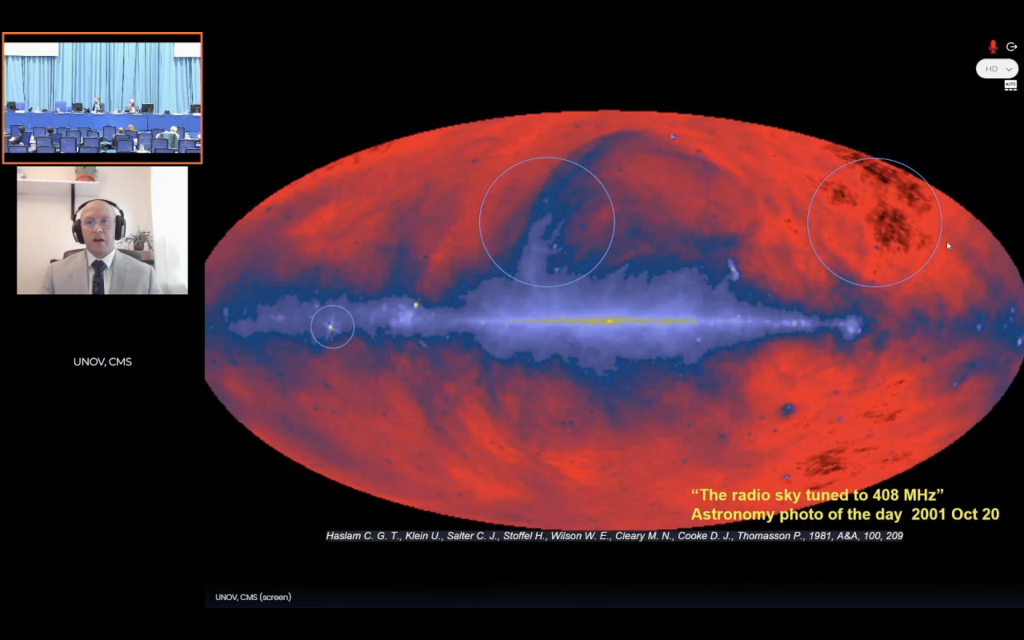UN body to continue deliberating on how to protect dark & quiet skies

In a historic first, the topic was accepted as a formal agenda item at the 59th session of the COPUOS Scientific and Technical Subcommittee that concluded last week in Vienna, Austria. Members agreed in their report to retain the agenda item at the next meeting in 2023.
The step follows the submission to the subcommittee of a working paper by an international collaboration involving the SKA Observatory (SKAO). The paper, also signed by the European Southern Observatory (ESO) and the International Astronomical Union (IAU), was endorsed by Austria, Chile, Slovakia, and Spain. It outlined four main actions to reduce the impact of the recent proliferation in the number of communication satellites on astronomical observatories.
‘Protection of space must be everyone’s priority’
The Head of the SKAO Director-General’s Office, Dr Simon Berry, relayed to the subcommittee the Observatory’s “continuous and intense concern” regarding the threats and opportunities associated with the pursuit of radio astronomy science worldwide.
“Opportunities include accelerated technological development and education in both the science of astronomy and the engineering required to sustain it. Threats come mainly from interference, and the growth in the use of the radio spectrum for communication, navigation, remote sensing, and various applied sciences.”
In 2020 and 2021, SKAO observer country Spain hosted two major conferences to discuss the threats to dark and quiet skies in collaboration with the UN Office for Outer Space Affairs and the IAU. The discussions, involving professional astronomy organisations, space industry, government representatives, legal and policy experts, and those interested in ensuring that the cultural importance of the night sky is preserved, formed the basis of the series of mitigation measures and approaches to ongoing dialogue that were captured in the paper presented to the subcommittee.
Spain noted in its statement: “Space is indispensable for the functioning of modern societies and its protection must be everyone’s priority […] This new agenda item must serve to create a framework for discussing the best ways to preserve astronomical observations and it provides the most convenient way to debate this question which is essential to guaranteeing a secure and sustainable environment in space.”
In further statements, SKAO’s host countries Australia, South Africa, and the United Kingdom as well as SKAO member and observer countries China, Italy, Netherlands, Portugal, Switzerland, France, Germany, and Canada commented positively on the topic. Other national delegations (Austria, Chile, Czech Republic, Finland, Indonesia, Philippines, Romania, Russia, Slovakia, Turkey, and the USA) followed, leading the subcommittee to agree to continue deliberating on the topic at the next subcommittee meeting in 2023.
Astronomical community takes proactive steps
The SKAO, in its capacity of permanent observer to COPUOS, furthermore availed itself to assist the subcommittee in any regard, emphasising that the Observatory takes its leadership responsibilities seriously.
As an example of proactivity from the astronomical community, the new IAU Centre for the Protection of the Dark and Quiet Sky from Satellite Constellation Interference (which the SKAO co-hosts with the US National Science Foundation’s NOIRLab) was presented by the IAU. This development was welcomed by several COPUOS member states.
Head of Assurance at the SKAO, Tim Stevenson, said he was pleased that the subject of protecting dark and quiet skies was placed on the subcommittee’s next meeting agenda despite how crowded with pressing issues COPUOS agendas are.
“States are generally supportive, and we succeeded in ensuring that the radio and optical interference effects of large satellite constellations on astronomy are considered by the subcommittee. We are looking forward to preparing and sustaining our case in COPUOS, which is the paramount forum in the world to deal with this issue.”
Read the IAU’s statement here.
Links




